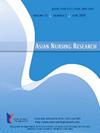宫颈癌术后患者的自我保健自我效能感和健康促进行为对癌症复发恐惧和创伤后成长的中介效应:一项横断面研究
IF 2.1
3区 医学
Q2 NURSING
引用次数: 0
摘要
目的:高复发风险是导致宫颈癌术后患者健康状况不佳的重要原因。本研究旨在确定宫颈癌术后患者对癌症复发的恐惧(FCR)对创伤后生长(PTG)的影响,并探讨自我护理自我效能感和健康促进行为在这一关系中的药效:方法:采用方便抽样法,在辽宁省三家三级甲等医院共招募了 334 名宫颈癌术后患者。采用一般信息问卷、恐惧进展问卷(对癌症复发的恐惧)、创伤后成长量表(PTG)、人们用于促进健康的策略(自我保健自我效能)和健康促进生活方式档案(健康促进行为)收集数据。数据分析采用描述性分析、皮尔逊相关分析和多元线性回归分析。使用 Amos 24.0 软件建立了结构方程模型:宫颈癌患者术后 PTG 与癌症复发恐惧呈显著负相关(r = -.54,P < .001),而与自我保健自我效能(r = .51,P < .001)和健康促进行为(r = .59,P < .001)呈正相关。中介模型显示,自我保健自我效能感(Boots 95% CI [-0.39,-0.15])和健康促进行为(Boots 95% CI:[-0.51,-0.24])分别独立地成为中介因素。自我保健自我效能感和健康促进行为在癌症复发恐惧与 PTG 之间具有显著的连锁中介效应(Boots CI:[-0.19, -0.07]),间接效应为 11.6%:本研究表明,自我保健自我效能感和健康促进行为在一定程度上调节了宫颈癌术后幸存者对癌症复发的恐惧与PTG之间的关系。在宫颈癌幸存者中实施有针对性的干预措施,重点提高自我保健自我效能感和健康促进行为,可能有助于减轻对宫颈癌复发的担忧,提高术后PTG。本文章由计算机程序翻译,如有差异,请以英文原文为准。
Mediation Effects of Self-care Self-efficacy and Health-promoting Behaviors on Fear of Cancer Recurrence and Posttraumatic Growth in Postoperative Patients With Cervical Cancer: A Cross-sectional Study
Purpose
High recurrence risks significantly contribute to poor health outcomes among postoperative cervical cancer patients. This study aimed to determine the impact of fear of cancer recurrence (FCR) on the posttraumatic growth (PTG) in postoperative cervical cancer patients and to investigate the mediating effects of self-care self-efficacy and health-promoting behaviors within this relationship.
Methods
A total of 334 cervical cancer patients who had undergone surgery in three tertiary hospitals in Liaoning Province, China, were recruited using a convenience sampling method. Data were collected using the general information questionnaire, the Fear of Progression Questionnaire (FCR), the Post-traumatic Growth Inventory (PTG), the Strategies Used by People to Promote Health (self-care self-efficacy), and the Health-Promoting Lifestyle Profile (health-promoting behaviors). Data analysis was performed using descriptive analysis, Pearson's correlations, and multiple linear regression analysis. A structural equation model was conducted using Amos 24.0 software.
Results
PTG of cervical cancer patients after surgery was significantly and negatively associated with FCR (r = −.54, p < .001), while positively correlated with self-care self-efficacy (r = .51, p < .001) and health-promoting behaviors (r = .59, p < .001). The mediation model revealed that self-care self-efficacy (Boots 95% CI 0.39 ∼ 0.15) and health-promoting behaviors (Boots 95% CI 0.51 ∼ 0.24) independently served as mediating factors, respectively. Self-care self-efficacy and health-promoting behaviors played a significant chain mediating effect between FCR and PTG (Boots 95% CI 0.19 ∼ 0.07), with an indirect effect of 11.6%.
Conclusion
This study demonstrated that self-care self-efficacy and health-promoting behaviors partially mediated the relationship between FCR and PTG in cervical cancer survivors after surgery. Implementing tailored interventions that focus on enhancing self-care self-efficacy and health-promoting behaviors among cervical cancer survivors may help alleviate concerns about cervical cancer recurrence and enhance PTG following surgery.
求助全文
通过发布文献求助,成功后即可免费获取论文全文。
去求助
来源期刊

Asian Nursing Research
NURSING-
CiteScore
4.20
自引率
4.50%
发文量
32
审稿时长
45 days
期刊介绍:
Asian Nursing Research is the official peer-reviewed research journal of the Korean Society of Nursing Science, and is devoted to publication of a wide range of research that will contribute to the body of nursing science and inform the practice of nursing, nursing education, administration, and history, on health issues relevant to nursing, and on the testing of research findings in practice.
 求助内容:
求助内容: 应助结果提醒方式:
应助结果提醒方式:


